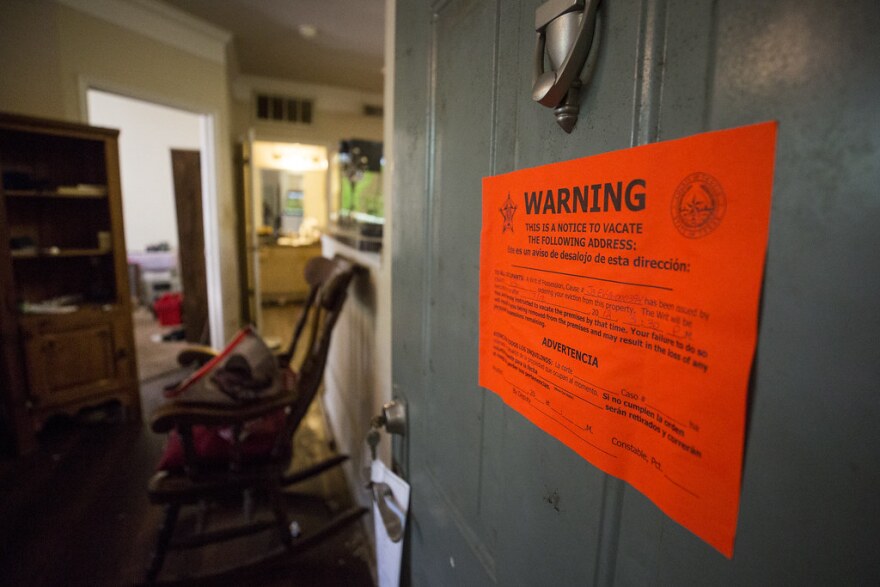Austin tenants affected financially by the COVID-19 pandemic have 60 days to come up with owed rent once a landlord starts threatening eviction.
With a unanimous vote Thursday, council members approved an ordinance adding another step to the eviction process, thereby slowing a potential force-out of tenants unable to pay rent because their wages have dried up. It goes into effect immediately and applies to both residential and commercial properties.
RELATED | Rent Deferred. Full Amount Due. What Landlords Are Telling Tenants During The COVID-19 Crisis.
“No one should lose their home during the pandemic,” Council Member Greg Casar, who brought the item forward, said. “It’s wrong and it’s also terrible for public health.”
There had been confusion on behalf of renters and landlords about how to move forward amid staggering unemployment. Some landlords have begun offering payment plans to those affected by the coronavirus, while others have reiterated that rent is due in full.
Before council’s vote, landlords could still file evictions against tenants, although Travis County judges are not hearing these cases. Judges have suspended eviction hearings until at least May 9.
The new rule buys renters time by adding a step to the eviction process, which typically begins when a landlord posts a "notice to vacate" sign on a tenant’s door. This indicates the intent to file an eviction with the courts within days unless the tenant pays rent or moves out. The city’s order requires landlords to notify tenants of a "proposed eviction" first, giving tenants 60 days to respond or pay rent in full before the landlord can post a "notice to vacate."
In a separate order posted Thursday, Mayor Steve Adler suspended a landlord’s ability to remove property from an apartment or lock out a tenant.
The majority of speakers who testified by phone supported the delay of evictions but said it was not enough. (The meeting was closed to ensure "social distancing.") Community groups, including the nonprofit Grassroots Leadership, sent a letter to council members Thursday asking them to allocate cash assistance – up to $10,000 per family – for those who’ve lost wages because of the pandemic.
In a separate ordinance passed Thursday, council members asked the city manager to identify funds for rental assistance; currently Austin does not have a program to give tenants assistance directly, although Travis County has one.
“This is merely kicking the can down the road,” Lily Velona testified. “We will have an eviction crisis on our hands in 60 days.” They and others called for a freeze on rent and utility payments.
But Adler said in a press conference that the city did not have the power to enact a freeze on rent.
Tenant advocates worry, too, about a rush of evictions in two months and recommend that if a tenant is able to pay rent in full, they do so.
Then comes the question of whether landlords, especially small ones, can survive going without rent for several months. While homeowners may be able to get their mortgage payments reduced or stalled for up to a year, many landlords do not finance their properties with traditional mortgages.
Manu Saini, a property manager and landlord in Austin, said the council action was unnecessary. He pointed to the federal stimulus bill, which – if passed – would give cash assistance of up to $1,200 to people making under a certain income, as an example of what may help tenants pay rent.
“Our phones have been ringing off the hook and we’re trying to help as many people as we can,” said Saini. “If you intervene and prevent us from collecting rent, we won’t be able to pay our employees. We’re going to lose our health care. Our employees are going to lose their jobs.”
A third ordinance passed Thursday could bring relief for some landlords: A measure to provide short-term small-business loans until federal disaster loans are received was changed to include multifamily and commercial real estate among the list of businesses eligible to apply.
“We do have individuals in this city that depend upon the rent they receive as landlords for one property or two properties and that’s what they depend upon to live on,” Council Member Ann Kitchen said.
Got a tip? Email Audrey McGlinchy at audrey@kut.org. Follow her on Twitter @AKMcGlinchy.
If you found the reporting above valuable, please consider making a donation to support it. Your gift pays for everything you find on KUT.org. Thanks for donating today.








